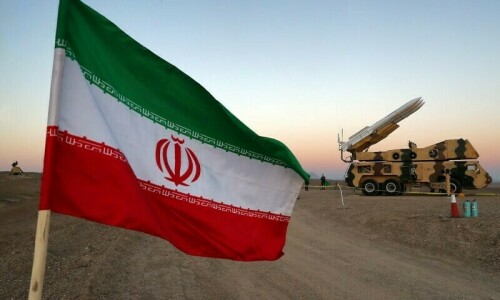Pakistan’s investment requirements for addressing its climate challenges are enormous, and then some.
In its Country Climate and Development Report, the World Bank estimated that Pakistan — one of the world’s top 10 countries most affected by climate change — needs $348 billion to adequately address its climate challenges till 2030. This consists of $152bn (44 per cent) to support adaptation and resilience and $196bn (56pc) for decarbonisation or mitigation.
The updated version of the nation’s Nationally Determined Contributions had in 2021 set a cumulative target of an overall 50pc reduction of its projected emissions, with a 15pc reduction using the country’s own resources, and an additional 35pc subject to international financial support.
The document says that Pakistan requires $101bn for its green energy transition alone, plus an additional $65bn by 2040, given the costs involved in completing in-progress renewable energy projects, building additional hydropower and transmission lines, and phasing out coal.
SDPI report explains Pakistan’s massive $348bn climate action and renewable energy financing needs can be met by Chinese investors
By 2030, it pledges, 60pc of all energy produced in the country will be generated from renewable resources, 30pc of all new vehicles sold in Pakistan in various categories will be electric, two new coal-fired power plants will be shelved in favour of hydroelectric power, and that a moratorium will remain in place on new coal power plants. Though there will be no generation of power through imported coal, there will be an increased focus on coal gasification and liquefaction from indigenous coal.
A new report by the Sustainable Development Policy Institute (SDPI) says Pakistan’s financing needs for low carbon development are massive. The report titled, ‘Low carbon development in Pakistan: opportunities and challenges for Chinese private sector’, highlights that the country requires $115.7bn for renewable energy transition: coal buyout, investment in solar and wind power, improvements in energy efficiency, and decarbonisation of the transport sector through electrification of vehicles, mass transit and revival of the railway.
The report is of the view that China’s low-cost new energy technologies have become a driving force for global energy transition, helping countries to achieve carbon neutrality and reduce carbon footprints, and, thus, can provide a fix for Pakistan’s climate and energy challenges, as well as its soaring electricity prices.
“Pakistan needs to collaborate with China under the framework of the China-Pakistan Economic Corridor (CPEC) to expedite green transition, promoting low-carbon development and countering adverse impacts of climate change,” it says.
The country’s green transition investment requirements also offer tremendous business opportunities for investors, the SDPI report continues. It argues that Pakistan’s financing needs in renewable energy transition, energy efficiency, and decarbonisation of transport present a substantial opportunity for the Chinese firms known for renewable energy technologies and electric vehicles to invest in technological solutions for this country’s energy and transportation sectors and engage in collaborative ventures.
The SDPI points out that Pakistan’s commitment to renewable energy, supported by favourable policies and vast potential in solar and wind, offers compelling opportunities for investment. The electric vehicle market in the country is also expanding, presenting opportunities for local manufacturing and establishing charging infrastructure.
“Strengthening collaboration between the Chinese private sector and Pakistan could be a game-changer, driving forward low-carbon energy initiatives through joint ventures in distributed generation projects and strengthening the technology supply chain,” it contends.
Furthermore, the reports highlight that the CPEC initiative has emerged as a key player in remodelling Pakistan’s energy sector outlook. Chinese banks and investors, particularly the China Development Bank and the Export-Import Bank of China, are already playing a significant role in financing projects under CPEC. Chinese investors have played a pivotal role in Pakistan’s renewable energy capacity, particularly in solar, representing approximately 87pc of foreign investment in solar PV.
While Pakistan has witnessed a shift in its energy policies, the country faces policy discrepancies, financial struggles, and investor apprehension, hindering the growth of renewable energy. The lack of coordination between federal and provincial governments, coupled with tariff renegotiations, is uncongenial to investment.
To encourage the adoption of renewable energy by the Chinese private sector, it is essential to establish effective communication channels involving stakeholders like the National Electric Power Regulatory Authority, the Central Power Purchasing Agency and the Private Power and Infrastructure Board, exploring green funding mechanisms, advancing green finance policies, and championing debt-for-climate swaps, the report asserts.
Further, the uncertainty surrounding foreign exchange availability leads to inefficiencies in financial planning and budgeting for the power sector, disrupting the cash flow management and making it a challenge to meet operational expenses and debt obligations. This is further exacerbated by delays in approvals from the State Bank for payments related to insurance, contractors, and consultants.
The issue of circular debt further compounds the investment reluctance among both local and foreign investors in the energy landscape, resulting in a barrier to existing and future private power projects. It has greatly harmed Pakistan’s economy and its capacity to transition away from carbon-intensive energy power generation.
That’s not all. The SDPI says private investment in Pakistan’s wind power sector is facing obstacles due to curtailment issues. Wind Power Projects claim that excessive curtailments, contested by the National Power Control Centre, are creating financial instability for investors. This curtailment violates contractual terms and contradicts Energy Purchase Agreements, discouraging both local and foreign investors.
The question is: would Chinese investors want to invest in Pakistan when the payment challenges have dampened their confidence? It is important that payments are made on schedule, mechanisms for liquidity damages are provided, and the integrity of contracts is upheld to expedite investments in renewable energy infrastructure and support the transition to low carbon initiatives.
Published in Dawn, The Business and Finance Weekly, September 9th, 2024















































